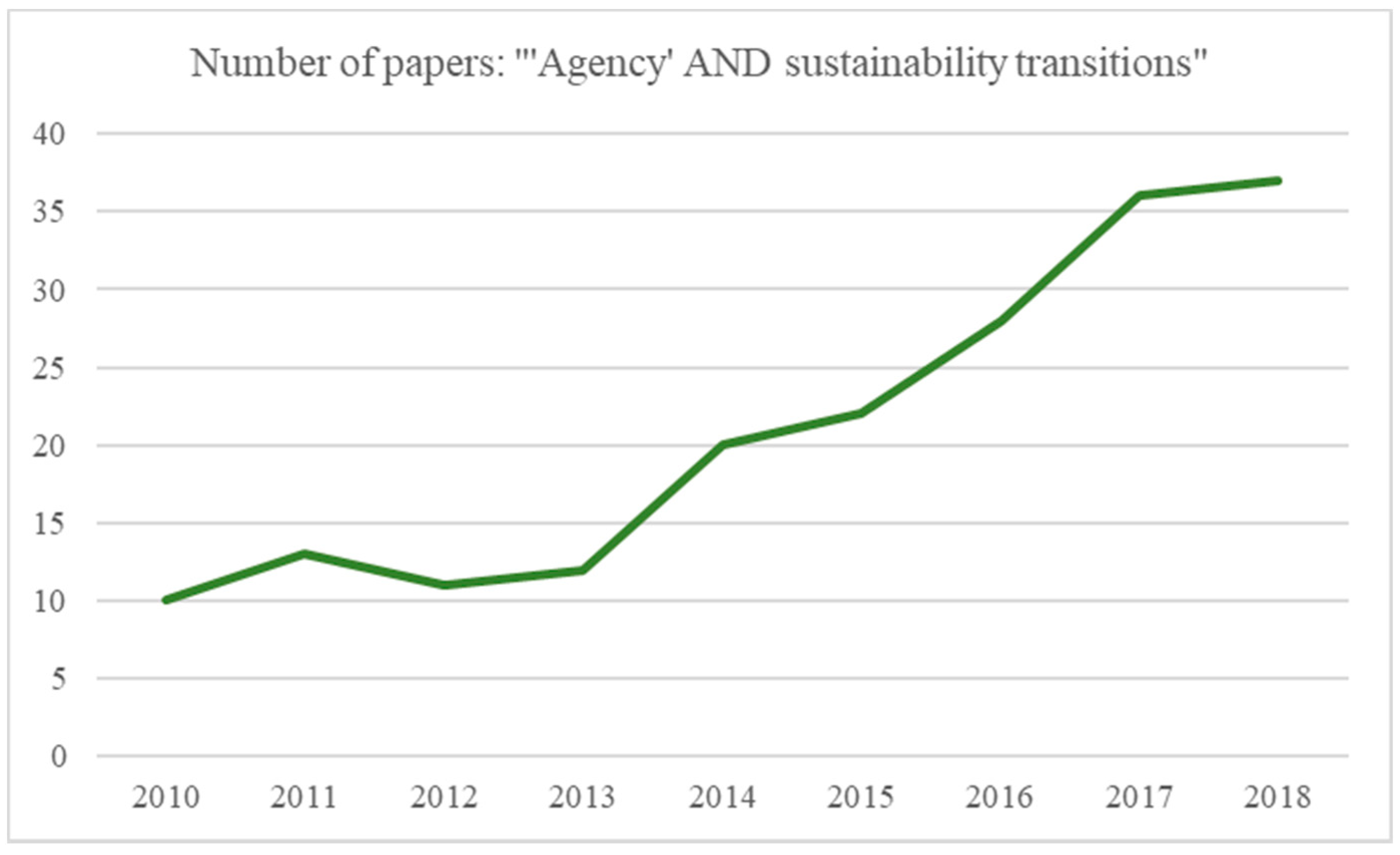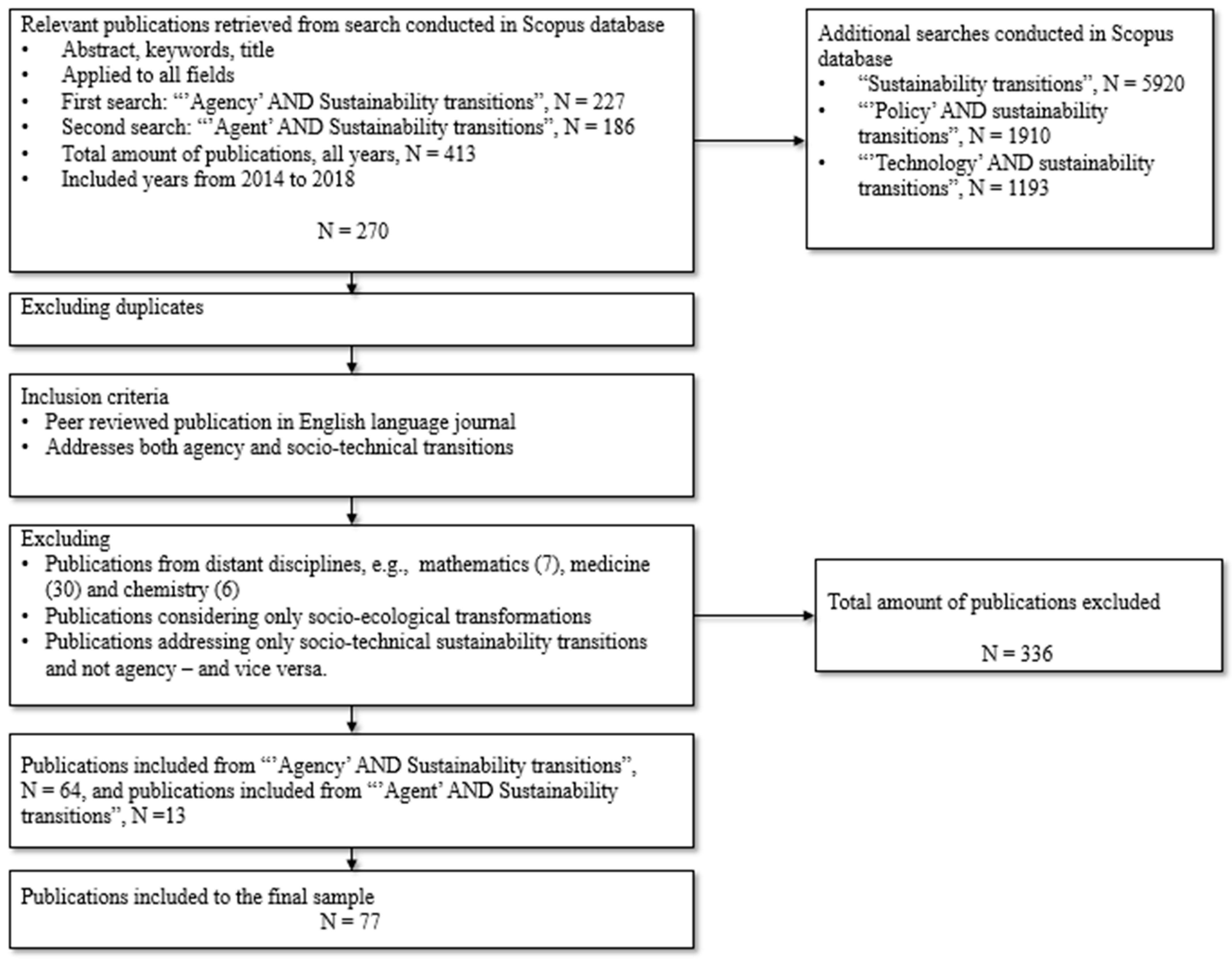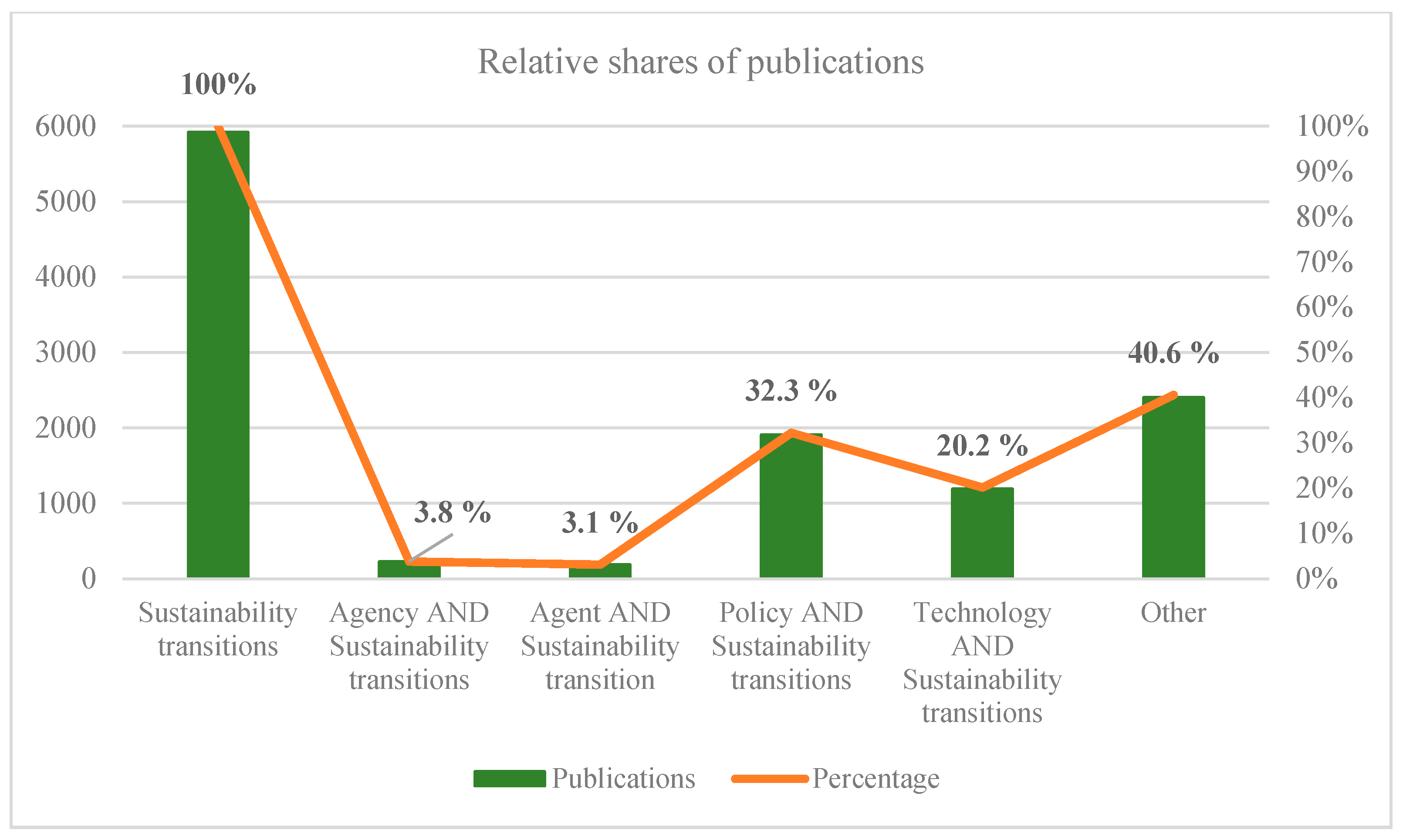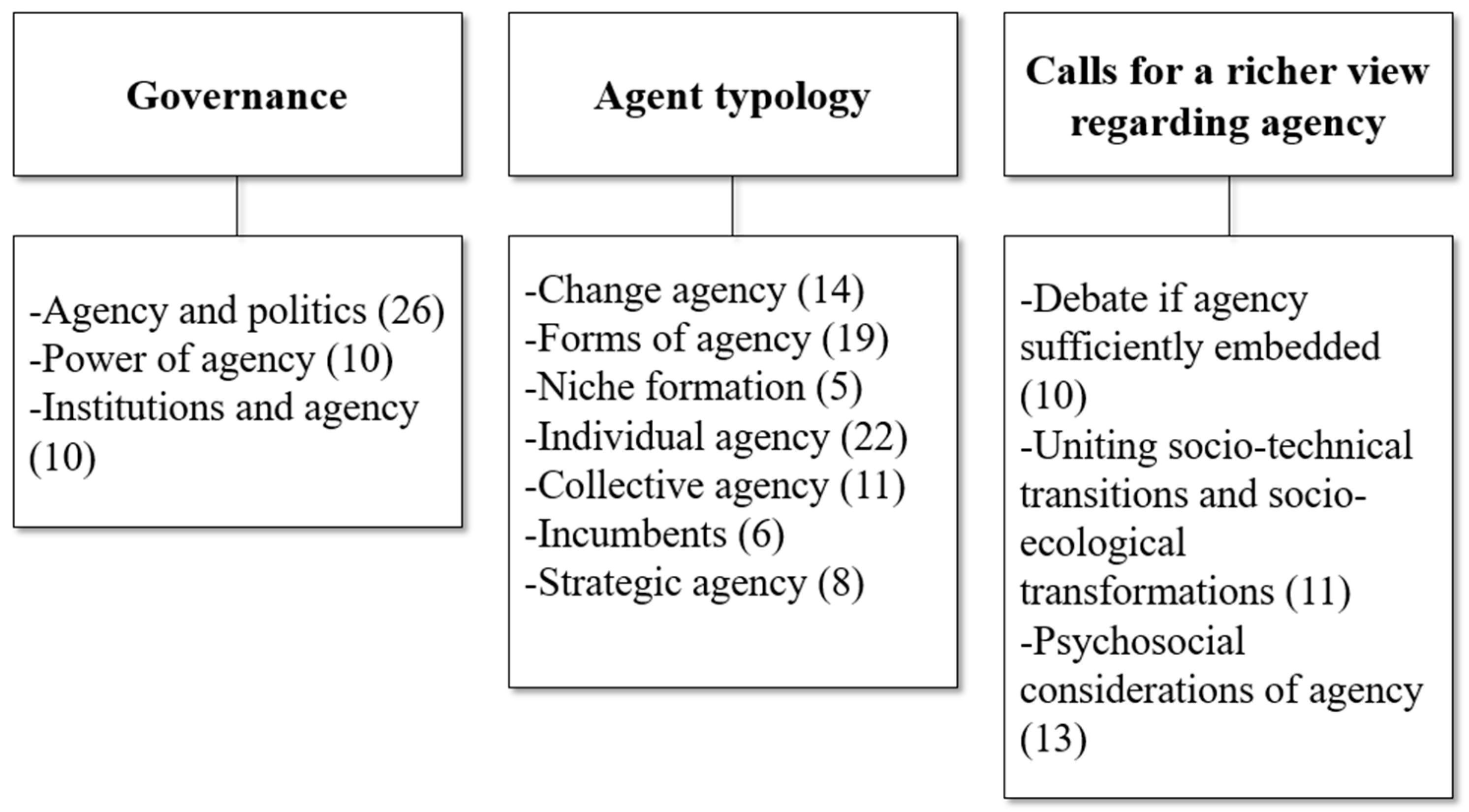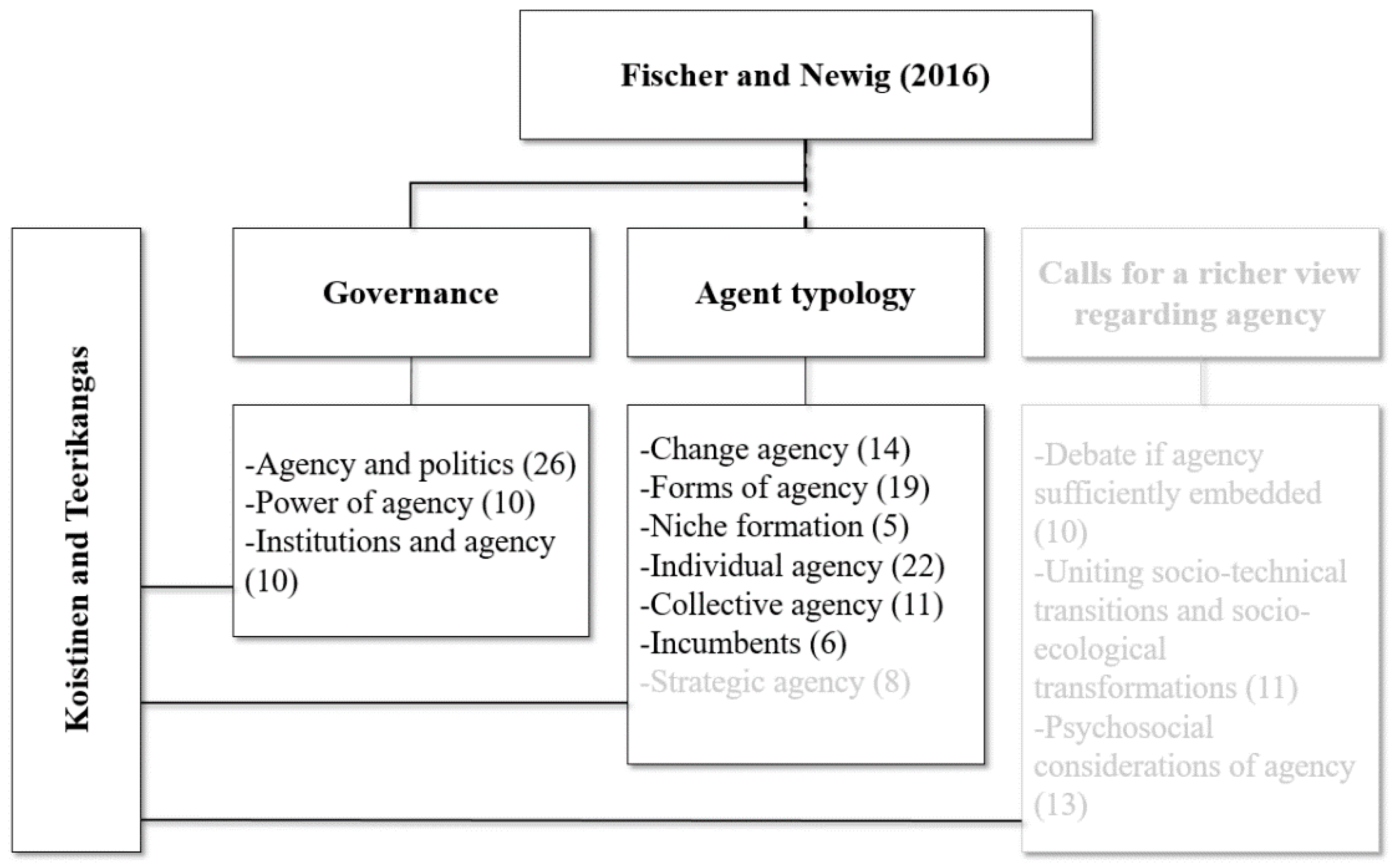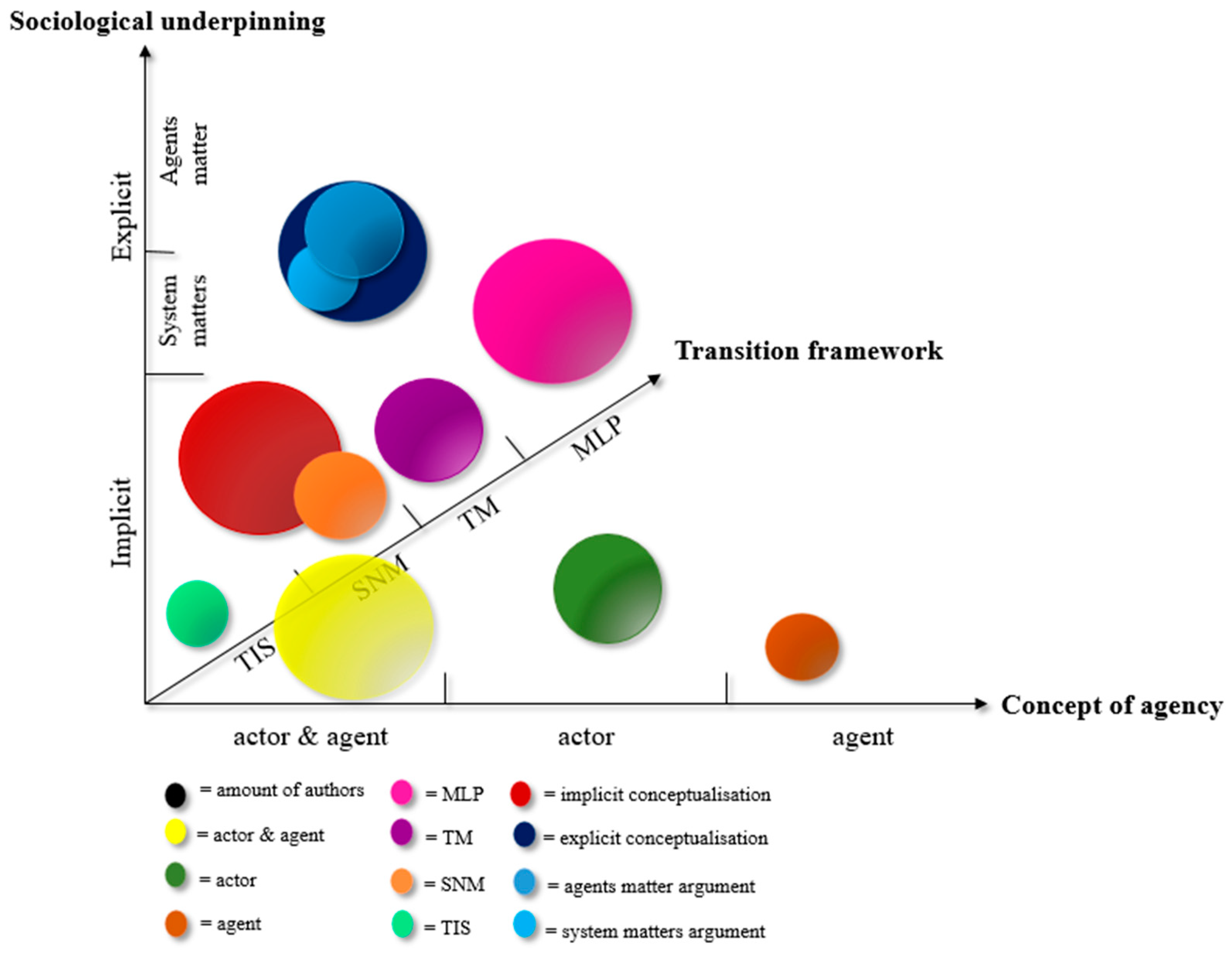Abstract
Transition studies is a growing discipline for addressing sustainability challenges. Traditionally, its focus has been at the system level. However, addressing sustainability challenges also requires attending to the role of agents in sustainability transitions. This is the focus adopted in this paper. We review the literature on agency in sustainability transitions, based on 77 journal articles on sustainability transitions listed in Scopus from 2014 to 2018. We find that agency is increasingly explored in the sustainability transitions literature. Despite this growing interest, this body of knowledge remains scattered in regard to typologies or theoretical framings. Our review leads us to identify three recurring themes. One theme drew our attention in particular: the transition research community is divided into those who argue that agency is sufficiently embedded in the transition literature and those who oppose this argument. Going forward, the dynamics of individual-level agency, including behaviors and motivation, deserve further attention.
1. Introduction
Human activities have resulted in major challenges that have led to surpassing the planetary boundaries of the global Earth system [1]. Unless imminent action is taken, humankind is facing a manmade disaster. In order to avoid this disaster, urgent and radical changes across societies around the world are called for [2,3].
The growing field of sustainability transitions addresses sustainability challenges [4]. The objective is to transform societies toward greater degrees of sustainability. Transitions involve a broad range of actors and typically take place over considerable time spans, such as 50 years or more [4]. Sustainability transition studies mainly analyze the changes in societal subsystems, such as energy or transport, with the focus being on social, technological and institutional interactions [5]. The current research pertaining to sustainability transitions draws from four dominating frameworks: (1) transition management (TM), (2) strategic niche management (SNM), (3) technological innovation system (TIS) and (4) multilevel perspective (MLP) on sociotechnical transitions [4].
Despite progress in transition research, sustainability threats are growing, with many remaining largely unsolved. The literature has typically emphasized understanding systemic changes at the macro-level, while the micro-level focus has been less attended to. Although actors are considered an integral part of the transition literature, they have not been the focus of the research field. The discipline is affected by criticism of the inadequate representations and implementation of agents and agency [6]. Recently, the role of individuals in sustainability transitions has gained increasing attention (e.g., [7,8,9,10,11,12]).
In the current paper, we follow this growing branch of research, building on the work of Fischer and Newig [10], who reviewed the role of actors in sustainability transitions between 1995 and 2014. Fischer and Newig [10] contributed by identifying a number of agent typologies. The authors noted that these different agent categories overlap in real-world contexts. The agent categories include regime, niche and landscape agents, as well as intermediaries, market actors, civil society and different governmental agents (e.g., local, regional and global). The authors argued that one agent can fall into more than one agent category, and that the different agent categories entail strong dependencies because, for example, niche emergence may be largely dependent on policy support [10]. In their conclusion, Fischer and Newig distinguished the study of agents into four different typologies:
- Systemic typology, which consists of the levels of the multilevel perspective;
- Institutional typology, which consists of state, market and civil society;
- Governance typology, including actors at different levels of governance;
- Intermediaries.
According to Fischer and Newig’s categorization, the policy perspective dominates the transition literature. They suggest that the progress of sustainability transitions depends on governance and its execution.
The world has, however, considerably changed over the past five years. The Paris 2015 agreement and the outbreak of individuals taking climate action, such as Greta Thunberg and Autumn Peltier, are exemplars of this change. Notwithstanding, since 2014, research on sustainability agency has burgeoned. A search for the terms agency and sustainability transitions in the Scopus database returns a substantially increased amount of publications since 2013 (see Figure 1). Arguably, there is thus a need to appreciate recent developments in the field. In the current paper, we address this need by reviewing the scholarly literature on agency in sustainability transitions. In particular, we explore if the findings of Fischer and Newig prevail and how the body of knowledge has evolved in the subsequent five years. Our analysis draws from 77 journal articles published between 2014 and 2018.
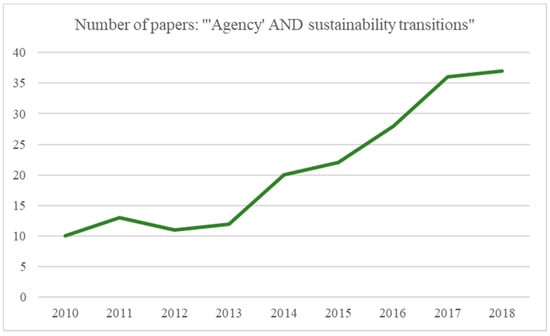
Figure 1.
Publications in the Scopus database that include the terms agency and sustainability transitions.
We define agency inspired by structuration theory as the human capability to make free choices and have an impact on one’s environment [13,14]. Thus, regarding terminology, we place an emphasis on the term “agent” instead of the term “actor”.
Our paper proceeds as follows. Next, we present the methods applied. Thereafter, we discuss the main themes observed in our review. We then critically assess the extant transition literature, positing our implications regarding the incoherent knowledge on agency across this scientific field. Finally, we discuss whether the findings noted by Fischer and Newig prevail.
2. Research Methods and Setting
To explore developments in the field of sustainability transitions, we undertook a systematic literature review. Our systematic review process is illustrated in Figure 2. We began with a literature search in the Scopus database. This database was selected due to its solid content coverage of the sampled years. To understand the broadness of the transition research field, we started with a general search for the term sustainability transitions in the Scopus database. This yielded over 5900 results, based on the term appearing in the abstract, title or keywords of publications. To contextualize the research on agency in a wider setting, we also undertook some additional searches, using a general sustainability transitions search, along with a search with the terms policy AND sustainability transition and then technology AND sustainability transitions. The general search of sustainability transitions yielded a total of 5920 papers. The search for policy AND sustainability transitions returned 1910 papers, whereas the search for technology AND sustainability transitions yielded a total of 1193 papers. All the above searches included all years.
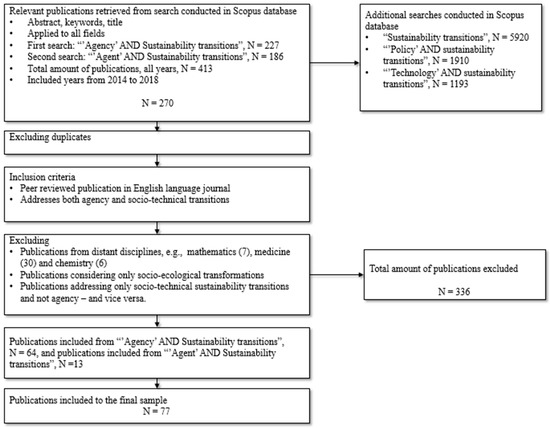
Figure 2.
The literature review process.
Because our aim was to explore the state-of-the-art of the literature on agency in the study of sustainability transitions, the selected terms for our focused search were agency AND sustainability transitions and agent AND sustainability transitions. We selected the terms “agent” and “agency” to include the sociological and psychological accounts of agency in the sustainability transitions literature. We chose the term “transitions” as it yielded results from the singular form “transition” as well as from the plural form “transitions”.
The results produced papers that included the search terms in the abstract, title or keywords. The search for agency AND sustainability transitions returned 227 results, whereas the search for agent AND sustainability transitions yielded 186 papers. The searches were initially applied to all years. After limiting the searches to cover the period from 2014 to 2018, the sample size was reduced to 270 publications. We noted that the search for agent AND sustainability transitions included many of the same papers as the agency AND sustainability transitions search. Thus, we first examined the search for agency AND sustainability transitions, and after a review of the papers returned, we conducted the agent AND sustainability transitions search and reviewed it to determine the final sample.
The final sample included only journal papers from the searches covering agency and agents in the transition literature. The original results included several papers from other fields of study, such as medicine and mathematics, which we excluded from the final sample. In addition, the search results included some publications that focused solely on sustainability transformations, and these were excluded from the final sample. Moreover, some papers addressed sustainability transitions but not agency or vice versa. After excluding all papers that did not focus on agency and sustainability transitions, a total of 77 journal articles were included in the final sample for review. Sixty-four papers out of 77 were from the agency AND sustainability transitions search, and 13 papers were added to the sample from the agent AND sustainability transitions search. The search for the keywords sustainability transitions, technology AND sustainability transitions, and policy AND sustainability transitions were conducted on 30 November 2018. Searches covering agents and sustainability transitions were conducted on 13 November 2018.
Overall, the papers were scattered across the broad discipline of environmental and sustainability research. The sample covered transition studies journals, such as the Journal of Cleaner Production, Research Policy and Technology Analysis & Strategic Management. In addition, publications included various other journals, such as Ecology & Society, Marine Policy and Climate Development. However, most publications appeared in Environmental Innovation and Societal Transition (15) and Sustainability (8), followed by Technological Forecasting and Social Change (6). The entire sample, including the journals and publication years, is illustrated in Table 1. In addition, all the authors can be found in Appendix A according to the publication year.

Table 1.
Final sample, including journals and publication years.
As our first observation, we noted that although agency has always been part of the transition literature, studies in this area remain scant in comparison with the overall field of sustainability transitions. When the search for agency AND sustainability transitions is compared with the general and contextual searches, such as those for sustainability transitions, policy AND sustainability transition and technology AND sustainability transitions, it appears that the research on agency is still relatively limited compared with other topics within transition research. Indeed, the general search for sustainability transitions yielded a total of 5920 papers, while the search for agency AND sustainability transitions returned 227 papers. Upon comparison (227/5920 × 100%), the study of agency accounted for approximately 3.8% of sustainability transition research papers. The search for policy AND sustainability transitions returned 1910 papers, whereas the search for technology AND sustainability transitions yielded a total of 1193 papers. Each search individually constituted roughly 32% of the general sustainability transition search. Given these numbers, it might be justified to claim that the study of agency and agents is not yet emphasized in the transition literature. The relative shares of different searchers compared with the general search of sustainability transitions are illustrated in Figure 3. Next, we proceed to detail our findings.
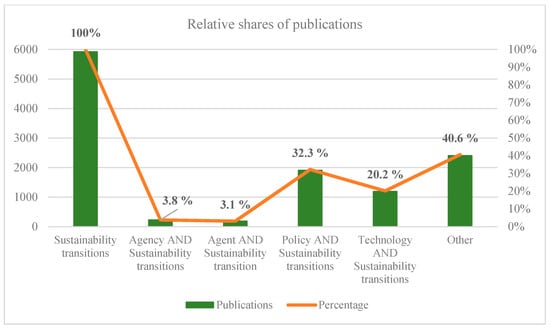
Figure 3.
Relative shares of publications in relation to different searches.
3. A Descriptive Analysis of the Sampled Articles
In data analysis, we were inspired by the principles of grounded theory, and we used data comparison and data reduction to create categories from our article sample [15]. The data analysis was carried out in two phases. The first phase was conducted in late 2018. The findings of the first phase were reported by Koistinen [16] in 2019, providing a thematic analysis of the findings. In the second phase of data analysis, from late 2019 to early 2020, we furthered and refined the data analysis by comparing and reducing the data to create categories. This led us to find higher order themes (Figure 4) and conceptual critique of the literature. In doing so, the paper, in its present form, matured.
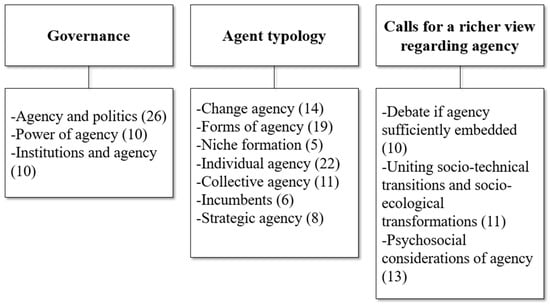
Figure 4.
Main themes in the literature on agency in sustainability transitions, 2014–2018. Numbers in brackets refer to authors presented in Table 2.
We observed that, in the transition literature, the study of agents and agency entailed various streams of research and appeared to be somewhat scattered. Initially, we identified 13 relevant concepts: “agency and politics”, “individual agency”, “forms of agency”, “change agency”, “psychosocial considerations on agency”, “uniting socio-technical transitions and socio-ecological transformations”, “collective agency”, “debate if agency sufficiently embedded”, “power of agency”, “institutions and agency”, “strategic agency”, “incumbents” and “niche formation”. Upon a closer look, all concepts save for “uniting socio-technical transitions and socio-ecological transformations” and “debate if agency sufficiently embedded” represented different agent types. In the transition literature, several papers emphasized the various forms of agency that agents undertake in a transition (e.g., [9,10,17]). However, we would like to argue that a typology of agency is not sufficient in describing the phenomenon of agents in transitions. Instead, we suggest that understanding transitions also requires appreciating the questions of how and why agents influence their surroundings. Thus, our concepts do not serve to extend the established agent typologies in the literature. Rather, our concepts describe the variety of how the notion of agency is currently applied in the transition literature. For example, papers considering the concept of “uniting socio-technical transitions and socioecological transformations” were discussing the sociology of agency (e.g., [18]) in parallel with integrating the disciplines of socioecological and sociotechnical origins.
To this end, Table 2 depicts the number of authors discussing each concept. We note that the most recurring concepts are “agency and politics” (26 papers), “individual agency” (22 papers) and “forms of agency” (19 papers).

Table 2.
Agency-related concepts appearing in journal articles on sustainability transitions, 2014–2018.
As we then proceeded to merge these 13 concepts toward higher order themes, we were able to identify three recurring themes: (1) governance, (2) agent typology and (3) calls for a richer view regarding agency, as illustrated in Figure 4. We present these three themes next.
First, our findings implied that the transition literature emphasized agency and governance (Figure 4). The majority of transition studies vis-à-vis agency discussed either governance, politics, power of agency or institutions and agency. We also observed that the concept of “power of agency” was often addressing political agency (e.g., [9]). The theme of “governance” included 46 papers in total. We have placed the concepts occurring most often—“agency and politics”—under the theme of governing transitions.
Second, we observed that studies considering agents and sustainability transitions often drew attention to different agent typologies. Thus, our theme of “agent typology” stressed the diversity of agents in transitions, including the concepts of “forms of agency”, “niche formation”, “individual agency”, “collective agency”, “incumbents” and “strategic agency”. Arguably, transition studies often considered agents as individual agents, because the concept of “individual agency” was repeatedly found in the sampled papers. Despite the emphasis on individual agency, the study on collectives and networks is emerging in the transition literature. The importance of collectives and networks is discussed via the concepts of “forms of agency”, “niche formation”, “collective agency”, “incumbents” and “strategic agency”. The concept of “collective agency” includes actor networks, actor interactions and distributed agency. Under forms of agency, we gathered various terms, such as consumer, engineer or intermediary, describing either individual or collective agency. Thus, the concept of “forms of agency” can be considered an agent typology.
Third, papers under the theme of “calls for a richer view regarding agency” adopted a critical take in the contemporary sustainability transitions literature. Thus, several papers stressed the need for a stronger appreciation of agency. In order to respond to this critique, these papers started to bridge this gap by introducing more diverse views on agency from other disciplines. We noted, for example, papers combining both sociotechnical transition and socioecological transformation studies. Second, we observed studies incorporating psychosocial insights. In addition, the papers in this theme noticed the transition literature, including a debate considering whether agency was sufficiently embedded in the literature or not. Taking a closer look, the authors further sought for a more robust appreciation of the sociological underpinnings of the transition literature. This leads us to continue with the sociological underpinnings of agency later in the paper.
4. Conceptual Critique of the Literature
Having presented the main themes emerging from our analysis, we now move onto presenting a conceptual critique of the literature on agency in sustainability transitions from 2014 to 2018. Echoing this line of thought, identifying the main themes from the literature led us to analyze the literature conceptually (Figure 5). This, in turn, led to us identifying four areas of critique toward the existing literature, which we present next.

Figure 5.
Conceptual critiques of the literature on agency in transition studies.
4.1. Scattered Use of Frameworks
First, we observed that the study on agency covered the dominant theoretical frameworks of the transition literature. We proceeded to explore critically the use of dominant transition frameworks in our sample. Table 3 represents an overview of authors who referred to the various transition frameworks either explicitly or implicitly. Our findings implied that although research on agency was present across the theoretical frameworks of the transition literature, critically speaking, this research was theoretically scattered.

Table 3.
The use of transition frameworks by different authors.
In their review, Fischer and Newig [10] suggested that the multilevel perspective was a key contribution and a core research strand in the transition literature. In our sample, the extant research on agency appeared to be slightly dominated by the multilevel perspective. In total, 40 papers (e.g., [19,20,21]) out of the entire sample of 77 were anchored in the multilevel perspective.
Interestingly, 24 publications did not mention the transition framework under exploration in their papers (e.g., [22,23,24]). The number of publications without a reference to a possible transition framework was the second-largest bulk of studies.
The use of other prominent frameworks of the transition literature appeared to be more incoherent in relation to agency and agents. Zooming in closer, the second most-used transition framework was transition management with 21 publications, followed by strategic niche management (16) and technological innovation systems (12). In addition, several publications, such as de Haan and Rotmans [6], Fischer and Newig [10], Mossberg et al. [25], Ollivier et al. [26], Rauschmayer et al. [27] and Wolfram and Frantzeskaki [28], referred to all the prominent sustainability transitions frameworks.
Taking a closer look, in total, 21 papers combined at least two of the prominent frameworks. A few papers in our sample coupled the multilevel perspective with another transition framework. For example, Pesch [12] discussed multilevel perspectives and sketched views on agency with the strategic niche management and transition management approaches. Pitt and Jones [29] applied the multilevel perspective with strategic niche management as well. Avelino and Wittmayer [9], de Goyyert et al. [30], Wanner et al. [31] and Brundiers and Eakin [32] coupled the multilevel perspective with transition management. Haley [33] combined insights from both the multilevel perspective and technological innovation systems. Gazheli et al. [34] applied the multilevel perspective and strategic niche management in their publication. On the other hand, Fuenfschilling and Truffer [35] incorporated transition management and technological innovation systems without using the multilevel perspective. The use of numerous frameworks is portrayed in Table 4 in more detail.

Table 4.
Use of numerous transition frameworks.
To sum up, the use of different transition frameworks in the study of agency can be considered either as a source of intellectual variety or as a potential threat of incoherence.
4.2. Scattered Conceptualizations of Agency
Second, our findings imply that the conceptualizations of agency remain scattered. Indeed, a total of 13 concepts in relation to agency were identified in the studied sample (see Table 2). In light of the size of the sample (77), this seems quite abundant. This confirms the findings of Fischer and Newig [10] and other authors (e.g., [6,9]).
Taking a closer look, we noticed that the terminology considering agency in sustainability transitions was also incoherent. We observed three dominating means of using the terminology in the literature: the term actor (e.g., [36,37]), the term agent e.g., [38,39] and a mix (e.g., [40,41]) of the prior two terms. Based on our findings, most of the reviewed papers (40 out of 77) tended to use the interchangeable terms of agent and actor to describe actors of sustainability transition. Table 5 illustrates how different papers used the terms incoherently to describe actors—or agents—in the transition literature. In addition to the terms agent and actor, other terms were used, such as individual, collective, consumer, citizen and public to describe the actors of sustainability transitions. To this end, Bögel et al. [42] did not use any of the dominating terms; the paper termed agents as individuals and collectives.

Table 5.
Authors using the term agent, actor or agent and actor.
4.3. Theoretical Underpinnings of Agency
Third, we noted that papers studying agency in sustainability transitions traced the theoretical origins of agency differently (Table 6). The majority of the papers (41) addressed the sociology of agency implicitly, while the rest of the sample (36) addressed the sociology of agency explicitly.

Table 6.
Authors referring to the sociological background of agency either explicitly or implicitly.
The publications that represented an explicit conceptualization of agency referred to theories addressing agency. Thus, we categorized them as authors addressing sociology explicitly. Although our interest was in the sociological theories of agency, drawing a line between sociology and various other theoretical streams of study was challenging given their connections. For example, complexity theory has influenced sociology [43], and institutional theory originates from institutional sociology [44]. Thus, Table 6 portrays the authors who used sociological theories, such as structuration theory or the social construction of technology, and authors using theories from neighboring disciplines, such as psychology, social psychology or organization studies (e.g., institutional theory).
In turn, the papers adopting an implicit conceptualization of agency typically did not define their conceptualization on agency. Taking a closer look, the papers tended to refer only to the transition literature. This does not simplify the picture, given that research on sustainability transitions rests on several competing theoretical frameworks, all used in the study of agency (Table 3). Thus, we assumed these authors were drawing their conceptualization of agency from some of those theories, although the actual conceptualization was somewhat hidden between the lines.
4.4. Agents Matter vs. System Matters
Zooming closer, we found that papers addressing the sociology of agency explicitly could be further divided between those arguing that agents matter and those arguing that the system matters. According to our categorization, 24 journal papers out of 36 papers argued that agents mattered more than the system, whereas a considerable number of publications (12 journal papers out of 36 papers) proposed that the system mattered more than the agents. This distinction is illustrated in Table 7. This finding echoes earlier findings [6,9]. Additionally, Fischer and Newig [10] observed this distinction, stressing the occurrence of actor- and system-based terms. Taking a closer look, in their paper, they avoided defining the theoretical underpinnings for the concepts of the actor and system; thus, the contextual factors for this debate remain largely unexplained.

Table 7.
Distinction between authors implying that agents matter versus implying that the system matters and the theoretical underpinnings of their works.
Based on our data, we looked into this distinction in more detail. To this end, we studied the theories used for each paper in addressing agency in sustainability transitions. We observed that the distinction between agents matter and the system matters is rather crude, as in practice, the authors’ views of agency were more elaborate. The more detailed findings from this analysis are presented next. Furthermore, the reader is encouraged to see the use of theories in more detail in Appendix B.
The typical background theories for emphasizing the system include structuration theory (e.g., [30,45,46]) and institutional theory (e.g., [35,47]). For example, institutional work (e.g., [45,48]), which could be traced back to the well-established institutional theory, emphasized agency. To the best of our knowledge, the publications in our sample arguing that the system matters, however, focused more on the institutional structures and patterning them than the actors’ agency (e.g., [48]). Similarly, agents were recognized, and the structure–agency debate was noted (e.g., [35,46,47]), but the papers tended to underline structure as an enabling or restrictive element rather than the agents and their active influence on the structure.
Our findings implied that well-established theories were addressed in a more agent-centric manner within the transition literature. For example, Merrie and Olsson [49], Antadze and McGowan [7] and Järnberg et al. [18] brought up a more agent-centric view of the institutional theory via the concept of institutional entrepreneurship. Taking a closer look, Ramos-Mejía and Balanzo [50] emphasized agency in institutional theory via institutional work. Furthermore, the papers by Pesch [12], Avelino [51], Hildén et al. [52] and Stephenson [53] adopted a view of structuration theory that emphasized the role of agency in determining structure, while structuration theory is often criticized for overemphasizing structure [11,54]. Taking a closer look, we also noted that structuration theory was adopted depending on the publication, repeatedly supporting both arguments, either system matters (e.g., [55,56]) or agents matter (e.g., [12,52,57,58]). This finding confirms a tradition in sociology in which structuration theory is either accused of overemphasizing the system or praised for prioritizing agents [59].
We further observed that the papers suggesting that agents matter over the system (e.g., [60,61]) often drew on various theories, such as practice theory [27], social cognitive identity theory [7] and a strong structuration framework [62] from the behavioral sciences. Regarding other themes, Antadze and McGowan [7] noticed that morality was an under-researched theme in the transition literature, and Stephenson [53] argued that questions of how culture influenced the behavior and behavior change of an individual agent were not explored in-depth in the literature. Koehrsen [63] stated that exploring religious agency and how it influenced the behavior of agents could help in understanding sustainability transitions more comprehensively. In addition, Bögel and Upham [64] argued that psychological theories were rarely applied in the transition literature. Van der Vleuten [11] similarly argued that this literature tended to neglect concrete agents and their behavior. These observations would posit that the absence of psychosocial factors from the transition literature constitutes a gap in this field of research. This finding also underpins the identified debate: Is agency sufficiently embedded in the transition literature or not? All the papers that call for a stronger integration of psychosocial or behavioral aspects in transition studies also tend to propose that agents matter over the system.
Furthermore, returning to the dominant frameworks of the transition literature, they also build on various seminal theories [65]. It can be argued that the rich mix of background theories underlying the field might explain the variety of theoretical frameworks used to appreciate agency (see Table 7). Returning to the background theories of sustainability transitions, they include system theory, complexity theory, evolutionary economics, neo-institutional theory, science and technology studies, structuration theory and actor–network theory. Thus, the perspective adopted on agency in the transition literature goes beyond this field. Indeed, the debate grounds for established social theories in academia.
Taking a closer look, system theory, for example, has typically focused on system-level changes, in which agents are seen as outputs for the system [66]. Similarly, evolutionary economics emphasizes the variation and selection environments of the system, in which agency is perceived as a provider of variation for the system [67,68]. The early notions in neo-institutional theory suggest that actions are shaped by the system [44,69]. However, a similar debate considering the relation of agency and structure later sprung out in neo-institutional theory [70,71]. Currently, neo-institutional theory includes questions such as how agency is embedded in the institutions and whether there is room for agency in the formation processes of institutions. The views on structuration theory are mixed. While structuration theory is criticized for belittling the influence of individual actors at the expense of attention to the system [14,54], some authors argue that agents and the duality of the structure through agents’ behaviors are the core concepts of structuration theory [13,72].
We observed that the debate in the transition literature had its roots further back in history than the transition literature’s existence. Those papers arguing that agency is sufficiently embedded in the transition literature bear different ontologies than those calling for stronger appreciation of agency. Without understanding the two (one could argue fundamentally) different ontologies, this heated debate may not show any signs of diminishing. Again, in reality, this distinction is not this straightforward, as the authors may have included other ontologies and perceptions in their use of theoretical underpinnings. Thus, this distinction remains more of a directional insight that may help in explaining the origins of the heated debate considering agency and sustainability transitions. It also mirrors the classic divide on agency vs. structure across sociology [73] and psychology [74].
To this end, we propose that this heated debate, at its worst, may even hinder sustainability transitions. We would also like to argue that to profoundly understand the changes needed to progress toward sustainable societies, an appreciation of behavioral factors (e.g., sociology, psychology and culture) are required. Thus, we call for a stronger representation of the different ontological views that could provide more room for the appreciation of individual agents.
5. Continuous Emphasis on Governance and Agent Typologies
Finally, we address how Fischer and Newig’s [10] findings connect with the present ones. To recap, our review identified three recurring themes in the study of agency in sustainability transitions from 2014 to2018 (see Figure 4): (1) governance, (2) agent typology and (3) calls for a richer view regarding agency.
In Figure 6, we depict the similarities and differences between these three themes and Fischer and Newig’s review. With the black color and black line, we indicate that our findings confirm Fischer and Newig’s findings. The gray color implies that these findings have emerged after Fischer and Newig’s review. The dashed line stands for partly confirming the findings of their review. The numbers in brackets refer to the authors presented in Table 2.
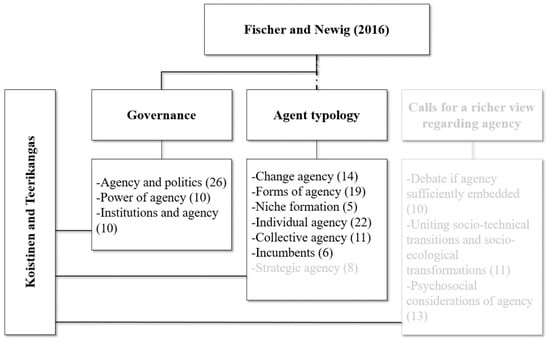
Figure 6.
Comparing how the themes of the current review (Figure 4) relate to Fischer and Newig’s findings.
Our first observation was that the contemporary transition literature on agency emphasized the role of governance and politics. While our literature review was not targeted at governance per se, a considerable stock of transition literature in relation to agency revolved around governance. Thus, the first recurring theme in our sample was categorized as “governance”. The initial concepts under the theme of “governance” in our findings were “agency and politics” [75], “agency and institutions” [76] and “power of agents” [77]. For example, Mercure et al. [78] addressed various modeling possibilities in selecting the most suitable policies for sustainability transitions. Going forward, Avelino [51] argued that the power typologies in the transition literature are often merely vertical. Thus, she offered a complementary horizontal understanding of the role of agents and power in governing transitions.
Similarly, Fischer and Newig [10] noted governance as one major agent category. Taking a closer look, Fischer and Newig emphasized the role of governance in sustainability transitions; they highlighted agents at different levels of governance. Moreover, they adopted a governing transitions perspective. According to this view, for example, market agents and civil society agents are seen as part of governance [10]. Zooming in closer, Fischer and Newig argued that governance itself and agents in national governance were the most dominant agents in transitions.
In addition, Fischer and Newig [10] identified the institutional typology, which relates to our concept of agency and institutions. Fischer and Newig conceptualized the essence of an institution to cover the state, the market, civil society and citizens. In turn, in the papers sampled for our review, institutions were perceived in a broader manner. For example, Antadze and McGowan [7] adopted a wider view of institutions by incorporating institutional theory and the concept of an institutional entrepreneur. Similarly, Fuenfschilling and Truffer [35] adopted the idea of institutional work—originating from institutional theory—in explaining how institutionalization unfolds through social action. To sum up, our findings implied that the emphasis on governing transitions was also highlighted in the contemporary transition literature.
The second recurring theme in our review was agent typology. Arguably, this finding echoes the path set by Fischer and Newig. According to Fischer and Newig [10] (p. 5), the objective of their review was to provide “a general overview of how actors and agency are used in transitions by mapping relevant actor typologies across all literature”. In other words, their focus was to create an agent typology. Taking a closer look, they set the scene by providing a comprehensive agent typology that arguably influenced the current studies on agency in the transition literature. Fischer and Newig constituted four major clusters of typologies: (1) systemic typology, (2) institutional typology, (3) governance typology and (4) intermediaries.
Similarly, in our 2014–2018 sample, several papers conceptualized agents through various categories. It is thus that we observed the recurring theme of agent typology as covering the following concepts: change agency [79,80], forms of agency [81], niche formation [82], individual agency [83,84], collective agency [85], strategic agency [86] and incumbents [87].
Our findings pointed to the tentative notion that the concept of strategic agency emerged after Fischer and Newig’s review. Fischer and Newig [10] acknowledged agents as having different strategies while also noting governance and business strategies. Bearing this in mind, strategic agency per se was not apparent in their findings. In our review, for example, de Haan et al. [88] incorporated human agency into transitions, especially in the form of strategic movement between agent categories. Moreover, Sørensen et al. [89] examined agency and agents in the form of consulting engineers. In their paper, they focused especially on engineers’ environmentally relevant strategies and practices.
Our findings, however, point to research on agency in sustainability transitions from 2014 to 2018 as addressing agents in various forms. For example, Kuokkanen et al. [90] paid attention to both individual and collective agency in regime destabilization. Pesch et al. [82] explored individual niche agents and their various strategies leading to successful niche developments. In turn, Bolton et al. [87] studied the agency of incumbent regime agents in the context of the UK’s energy sector. Frantzeskaki et al. [91] empirically delved into a formation process of a transition arena by studying over 100 change agents. Whereas Fischer and Newig raised intermediaries as a major agent type in their review, we conceptualized intermediaries merely as one form of agency amidst others. Thus, we clustered the publications addressing intermediaries (e.g., [92]) under the concept of forms of agency. In summation, based on our review, we found the theme of agent typology, confirming Fischer and Newig’s findings.
The third recurring theme in our sample was calls for a richer view regarding agency. This theme included the following concepts: debate if agency was sufficiently embedded [93,94], uniting sociotechnical transitions and socioecological transformations [95,96] and psychosocial considerations of agency [97]. For example, van der Vleuten [11] argued that the sustainability transition literature contained a heated debate considering agency, which could be seen as including other streams of studies, such as the deep transitions approach. In addition, various scholars have noted a gap in the transition literature; studies on sociotechnical transitions and socioecological transformations have emerged largely independently [98]. As a bid to close this gap, many scholars include elements from both the transition and transformation fields along with agency (e.g., [40,99]) to bridge the two distinct disciplines. Based on an extensive review of the literature, Bögel and Upham [64] observed the use of psychological theories being limited.
Interestingly, this theme was not evident in Fischer and Newig’s review. They noted that the transition literature entailed views proposing the idea that agency was sufficiently addressed in the field as well as opposing arguments. However, they did not explicitly discuss calls from various scholars to integrate broader views on agency into transition studies. To this end, our findings suggest that the growing calls for a richer view considering agency in sustainability transitions have mounted since Fischer and Newig’s review in 2016.
To conclude, in line with Fischer and Newig [10], we noted that studies considering agency and sustainability transitions had an ongoing tradition in highlighting the role of governance and various agent categories. In addition, Fischer and Newig pointed out the role of institutions in their work. However, the literature has since conceptualized institutions in a broader sense and entailed various views from institutional theory. Going forward, our findings provide insights suggesting that the research on sustainability transitions and agency has already diversified in the five years following Fischer and Newig’s review. In particular, the publications considering agents’ strategies and persistent calls to include a richer view on agency in transition studies have emerged.
6. Conclusions
In this paper, we reviewed the literature on agency in the extant sustainability transitions literature in the years 2014–2018. Regarding our main findings, first, we observed that research on agency in transitions is increasing. Second, we identified three recurring themes in the contemporary transition literature on agency: (1) governance, (2) agent typologies and (3) calls for richer views regarding agency. Third, based on our findings, we showed how the study on agency in the transition literature is scattered and set amid various theoretical underpinnings. The literature tends to be set amid a persistent debate emphasizing either the system or the agent as bearing primary importance. This dichotomy reflects how the debate on agency in the transition literature draws from seminal theories across the social sciences. Taking a broader take, this dichotomy thus characterizes ontological and epistemological divides throughout the social sciences [100]. Fourth, the literature on agency in sustainability transition research has diversified over the past five years. Emerging topics in the literature relate to mounting calls for a richer view regarding agency and the growing research on strategic agency.
In an attempt to synthesize our findings, we have developed an integrative, illustrative framework. By means of the paper’s summary, Figure 7 portrays the scattered nature and the current incoherencies in the study on agency in transition studies.
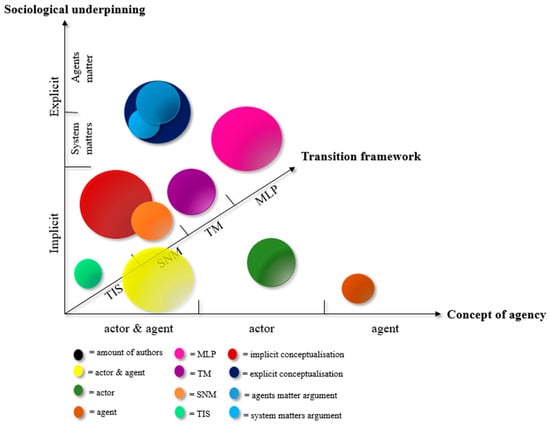
Figure 7.
Illustration of the scatteredness of the study of agency in transition studies.
Limitations of Our Research and Future Research Directions
As this paper is a literature review, it does not allow us as authors to provide new empirical insights. Instead, the value added in literature reviews is to provide a basis for researchers to appreciate the state of the art and to identify future research directions. Taking a closer look, our findings imply that the study on agency is scattered amid the discipline. To this end, future empirical studies are needed. We call for both empirical qualitative and quantitative studies to bring more soundness to the increasing research on agency in the transition literature.
Another limitation concerns the years included to our review. Our literature review focused on only five years (2014–2018). This choice stemmed from the fact that we sought to do a review of the literature five years after the review of Fischer and Newig [10], who reviewed the literature to the year 2014. Our review pointed to the fact that the transition discipline is rapidly evolving, as is its interest in agency. Hence, a five-year window enabled the analysis of 77 papers. Going forward, we recommend that scholars conduct literature reviews on the main thematic areas in the field of transition studies. Reviews could be implemented on a regular basis as longitudinal studies to follow the growing interest in the main thematic areas, such as agency, in the research field of sustainability transitions. Furthermore, subsequent reviews could incorporate other search engines such as Google Scholar to bring further diversity into the sample of reviewed papers.
A further limitation of our work relates to the focus of the literature search, as our search was based on abstracts, keywords and titles. This focus was selected in order to identify papers that explicitly focused on agency in sustainability transitions. While the combination of abstracts, keywords and titles yielded papers focusing on the phenomenon under scrutiny, a more detailed review including entire articles would provide a view of papers mentioning agency in passing without focusing on this topic.
In addition, our search was targeted at the sociological origins of agency in sustainability transitions. Our findings point to the fact that the transition literature yields persistent calls to include a richer view on agency in transition studies. To this end, reviews as well as empirical studies from other fields of social sciences, such as behavioral cognitive studies, cultural studies or psychology, are called for.
In conclusion, we call for stronger appreciation regarding agents actively influencing their surroundings. Going forward, there is a need for more conceptual clarity and coherence in the literature. As the review is based on the years 2014–2018, ongoing reviews and empirical studies of the field are needed.
Author Contributions
Conceptualization, K.K.; formal analysis, K.K.; funding acquisition, S.T.; investigation, K.K.; methodology, K.K. and S.T.; visualization, K.K. and S.T.; writing—original draft, K.K. and S.T.; writing—review and editing, K.K. and S.T. All authors have read and agreed to the published version of the manuscript.
Funding
The authors are appreciative to the From Innovation to Business Ecosystems (CICAT2025) project (0245896-2018) of the Strategic Research Council of the Academy of Finland, which has supported the work reported here.
Institutional Review Board Statement
Not applicable.
Informed Consent Statement
Not applicable.
Data Availability Statement
Not applicable.
Conflicts of Interest
The authors declare no conflict of interest. The funders had no role in the design of the study; in the collection, analyses, or interpretation of data; in the writing of the manuscript; or in the decision to publish the results.
Appendix A
In Appendix A, all the authors and the publications of the literature review are listed for the reader.

Table A1.
The entire sample.
Table A1.
The entire sample.
| Year | Authors | Publication |
|---|---|---|
| 2014 | Arapostathis, S., Pearson, P.J.G., Foxon, T.J. | UK natural gas system integration in the making, 1960–2010: Complexity, transitional uncertainties and uncertain transitions |
| 2014 | Bakker, S. | Actor rationales in sustainability transitions—Interests and expectations regarding electric vehicle recharging |
| 2014 | Frantzeskaki, N., Wittmayer, J., Loorbach, D. | The role of partnerships in “realising” urban sustainability in Rotterdam’s City Ports Area, the Netherland |
| 2014 | Hausknost, D. | Decision, choice, solution: “agentic deadlock” in environmental politics |
| 2014 | Merrie, A., Olsson, P. | An innovation and agency perspective on the emergence and spread of Marine Spatial Planning |
| 2014 | Stirling, A. | Transforming power: Social science and the politics of energy choices |
| 2014 | Wittmayer, J.M., Schäpke, N. | Action, research and participation: roles of researchers in sustainability transitions |
| Sum | 7 | |
| 2015 | Bergek, A., Hekkert, M., Jacobsson, S., Markard, J., Sandén, B., Truffer, B. | Technological innovation systems in contexts: Conceptualizing contextual structures and interaction dynamics |
| 2015 | Bettini, Y., Brown, R.R., de Haan, F.J., Farrelly, M. | Understanding institutional capacity for urban water transitions |
| 2015 | Bolton, R., Foxon, T.J., Hall, S. | Energy transitions and uncertainty: Creating low carbon investment opportunities in the UK electricity sector |
| 2015 | Ferguson, R.S., Lovell, S.T. | Grassroots engagement with transition to sustainability |
| 2015 | Gazheli, A., Antal, M., van den Bergh, J. | The behavioral basis of policies fostering long-run transitions: Stakeholders, limited rationality and social context |
| 2015 | Kern, F. | Engaging with the politics, agency and structures in the technological innovation systems approach |
| 2015 | Mercure, J.F. | An age structured demographic theory of technological change |
| 2015 | Pesch, U. | Tracing discursive space: Agency and change in sustainability transitions |
| 2015 | Rauschmayer, F., Bauler, T., Schäpke, N. | Towards a thick understanding of sustainability transitions—Linking transition management, capabilities and social practices |
| 2015 | Rogers, B.C., Brown, R.R., De Haan, F.J., Deletic, A. | Analysis of institutional work on innovation trajectories in water infrastructure systems of Melbourne, Australia |
| 2015 | Sorrell, S. | Reducing energy demand: A review of issues, challenges and approaches |
| 2015 | Upham, P., Lis, A., Riesch, H., Stankiewicz, P. | Addressing social representations in socio-technical transitions with the case of shale gas |
| Sum | 12 | |
| 2016 | Avelino, F., Wittmayer, J.M. | Shifting power relations in sustainability transitions: A multi-actor perspective |
| 2016 | Chelleri, L., Kua, H.W., Sánchez, J.P.R., Md Nahiduzzaman, K., Thondhlana, G. | Are people responsive to a more sustainable, decentralized, and user-driven management of urban metabolism? |
| 2016 | Condorelli, R. | Complex Systems Theory: Some Considerations for Sociology. |
| 2016 | Davidson, D.J., Jones, K.E., Parkins, J.R. | Food safety risks, disruptive events and alternative beef production: a case study of agricultural transition in Alberta |
| 2016 | de Gooyert, V., Rouwette, E., van Kranenburg, H., Freeman, E., van Breen, H. | Sustainability transition dynamics: Towards overcoming policy resistance |
| 2016 | de Haan, F.J., Rogers, B.C., Brown, R.R., Deletic, A. | Many roads to Rome: The emergence of pathways from patterns of change through exploratory modelling of sustainability transitions |
| 2016 | Fischer, L-B., Newig, J. | Importance of actors and agency in sustainability transitions: A systematic exploration of the literature |
| 2016 | Fuenfschilling, L., Truffer, B. | The interplay of institutions, actors and technologies in socio-technical systems—An analysis of transformations in the Australian urban water sector |
| 2016 | Gaede, J., Meadowcroft, J. | A question of authenticity: Status quo bias and the international energy agency’s world energy outlook |
| 2016 | Gorissen, L., Vrancken, K., Manshoven, S. | Transition thinking and business model innovation-towards a transformative business model and new role for the reuse centers of Limburg, Belgium |
| 2016 | Hermans, F., Roep, D., Klerkx, L. | Scale dynamics of grassroots innovations through parallel pathways of transformative change |
| 2016 | Mercure, J.F., Pollitt, H., Bassi, A.M., Viñuales, J.E., Edwards, N.R. | Modelling complex systems of heterogeneous agents to better design sustainability transitions policy |
| 2016 | Pitt, H., Jones, M. | Scaling up and out as a pathway for food system transitions |
| 2016 | Sarrica, M., Brondi, S., Cottone, P., Mazzara, B.M. | One, no one, one hundred thousand energy transitions in Europe: The quest for a cultural approach |
| 2016 | Stahlbrand, L. | The Food For Life Catering Mark: Implementing the Sustainability Transition in University Food Procurement |
| 2016 | Werbeloff, L., Brown, R.R., Loorbach, D. | Pathways of system transformation: Strategic agency to support regime change |
| 2016 | Wolfram, M., Frantzeskaki, N. | Cities and systemic change for sustainability: Prevailing epistemologies and an emerging research agenda |
| Sum | 17 | |
| 2017 | Affolderbach, J., Rob Krueger, R. | ‘“Just” ecopreneurs: reconceptualising green transitions and entrepreneurship’ |
| 2017 | Antadze, N., McGowan, K.A. | Moral entrepreneurship: Thinking and acting at the landscape level to foster sustainability transitions |
| 2017 | Avelino, F. | Power in Sustainability Transitions: Analysing power and (dis)empowerment in transformative change towards sustainabilit |
| 2017 | Haley, B. | Designing the public sector to promote sustainability transitions: Institutional principles and a case study of ARPA-E |
| 2017 | Hildén, M., Jordan, A., Huitema, D. | Special issue on experimentation for climate change solutions editorial: The search for climate change and sustainability solutions—The promise and the pitfalls of experimentation |
| 2017 | Johannessen, Å., Wamsler, C. | What does resilience mean for urban water services? |
| 2017 | Klinke, A. | Dynamic multilevel governance for sustainable transformation as postnational configuration |
| 2017 | Kuhmonen, T. | Exposing the attractors of evolving complex adaptive systems by utilising futures images: Milestones of the food sustainability journey |
| 2017 | Lockwood, M., Kuzemko, C., Mitchell, C., Hoggett, R. | Historical institutionalism and the politics of sustainable energy transitions: A research agenda. |
| 2017 | Loorbach, D., Frantzeskaki, N., Avelino, F. | Sustainability Transitions Research: Transforming Science and Practice for Societal Change |
| 2017 | Partzsch, L. | “Power with” and “power to” in environmental politics and the transition to sustainability |
| 2017 | Pesch, U., Vernay, A.L., van Bueren, E., Pandis Iverot, S. | Niche entrepreneurs in urban systems integration: On the role of individuals in niche formation |
| 2017 | Randelli, F., Rocchi, B. | Analysing the role of consumers within technological innovation systems: The case of alternative food networks |
| 2017 | Udovyk, O. | “I cannot be passive as I was before”: learning from grassroots innovations in Ukraine |
| 2017 | van Poeck, K., Læssøe, J., Block, T. | An exploration of sustainability change agents as facilitators of nonformal learning: Mapping a moving and intertwined landscape |
| Sum | 15 | |
| 2018 | Barnes, J., Durrant, R., Kern, F., MacKerron, G. | The institutionalisation of sustainable practices in cities: how initiatives shape local selection environments |
| 2018 | Boodoo, Z., Mersmann, F., Olsen, K.H. | The implications of how climate funds conceptualize transformational change in developing countries |
| 2018 | Brundiers, K., Eakin, H.C. | Leveraging post-disasterwindows of opportunities for change towards sustainability: A framework |
| 2018 | Bögel, P., Oltra, C., Sala, R., Lores, M., Upham, P., Dütschke, E., Schneider, U., Wiemann, P. | The role of attitudes in technology acceptance management: Reflections on the case of hydrogen fuel cells in Europe |
| 2018 | Bögel, P.M., Upham, P., 2018 | The role of psychology in sociotechnical transitions literature: A review and discussion in relation to consumption and technology acceptance |
| 2018 | de Haan, F.J., Rotmans, J. | A proposed theoretical framework for actors in transformative change |
| 2018 | Durrant, R., Barnes, J., Kern, F., Mackerron, G. | The acceleration of transitions to urban sustainability: a case study of Brighton and Hove |
| 2018 | Goyal, N., Howlett, M. | Technology and instrument constituencies as agents of innovation: Sustainability transitions and the governance of urban transport |
| 2018 | Järnberg, L., Enfors Kautsky, E., Dagerskog, L., Olsson, P. | Green niche actors navigating an opaque opportunity context: Prospects for a sustainable transformation of Ethiopian agriculture |
| 2018 | Kivimaa, P., Martiskainen, M. | Dynamics of policy change and intermediation: The arduous transition towards low-energy homes in the United Kingdom |
| 2018 | Kivimaa, P., Boon, W., Hyysalo, S., Klerkx, L. | Towards a typology of intermediaries in sustainability transitions: A systematic review and a research agenda |
| 2018 | Koehrsen, J. | Religious agency in sustainability transitions: Between experimentation, upscaling, and regime support |
| 2018 | Kuokkanen, A., Nurmi, A., Mikkilä, M., Kuisma, M., Kahiluoto, H., Linnanen, L. | Agency in regime destabilization through the selection environment: The Finnish food system’s sustainability transition |
| 2018 | Matschoss, K., Heiskanen, E. | Innovation intermediary challenging the energy incumbent: enactment of local socio-technical transition pathways by destabilisation of regime rules |
| 2018 | Mossberg, J., Söderholm, P., Hellsmark, H., Nordqvist, S. | Crossing the biorefinery valley of death? Actor roles and networks in overcoming barriers to a sustainability transition |
| 2018 | Novalia, W., Brown, R.R., Rogers, B.C., Bos, J.J. | A diagnostic framework of strategic agency: Operationalising complex interrelationships of agency and institutions in the urban infrastructure sector |
| 2018 | Ollivier, G., Magda, D., Mazé, A., Plumecocq, G., Lamine, C. | Agroecological transitions: What can sustainability transition frameworks teach us? An ontological and empirical analysis |
| 2018 | Pflitsch, G., Radinger-Peer, V. | Developing boundary-spanning capacity for regional sustainability transitions-A comparative case study of the universities of Augsburg (Germany) and Linz (Austria) |
| 2018 | Pigford, A.A.E., Hickey, G.M., Klerkx, L. | Beyond agricultural innovation systems? Exploring an agricultural innovation ecosystems approach for niche design and development in sustainability transitions |
| 2018 | Ramos-Mejía, M., Balanzo, A. | What it takes to lead sustainability transitions from the bottom-up: Strategic interactions of grassroots ecopreneurs |
| 2018 | Stephenson, J. | Sustainability cultures and energy research: An actor-centred interpretation of cultural theory |
| 2018 | Sørensen, K.H., Lagesen, V.A., Hojem, T.S.M. | Articulations of sustainability transition agency. Mundane transition work among consulting engineers |
| 2018 | Temper, L., Walter, M., Rodriguez, I., Kothari, A., Turhan, E. | A perspective on radical transformations to sustainability: resistances, movements and alternatives |
| 2018 | Upham, P., Dütschke, E., Schneider, U., Oltra, C., Sala, R., Lores, M., Klapper, R., Bögel, P. | Agency and structure in a sociotechnical transition: Hydrogen fuel cells, conjunctural knowledge and structuration in Europe |
| 2018 | van der Vleuten, E. | Radical change and deep transitions: Lessons from Europe’s infrastructure transition 1815–2015 |
| 2018 | Wanner, M., Hilger, A., Westerkowski, J., Rose, M., Stelzer, F., Schäpke, N. | Towards a Cyclical Concept of Real-World Laboratories: A Transdisciplinary Research Practice for Sustainability Transitions |
| Sum | 26 | |
| Total | 77 |
Appendix B
Appendix B depicts the authors of the sample addressing sociological origins and their use of theories.
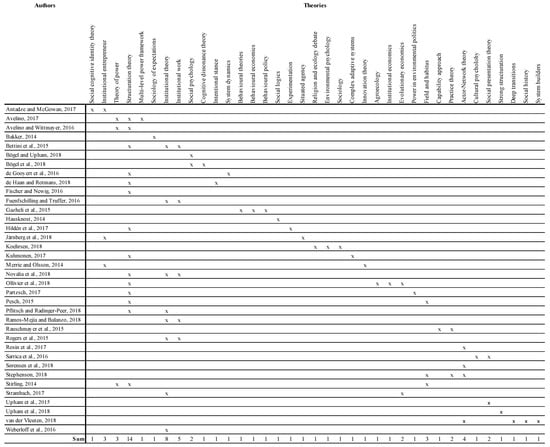
Figure A1.
Use of theories by authors.
Figure A1.
Use of theories by authors.
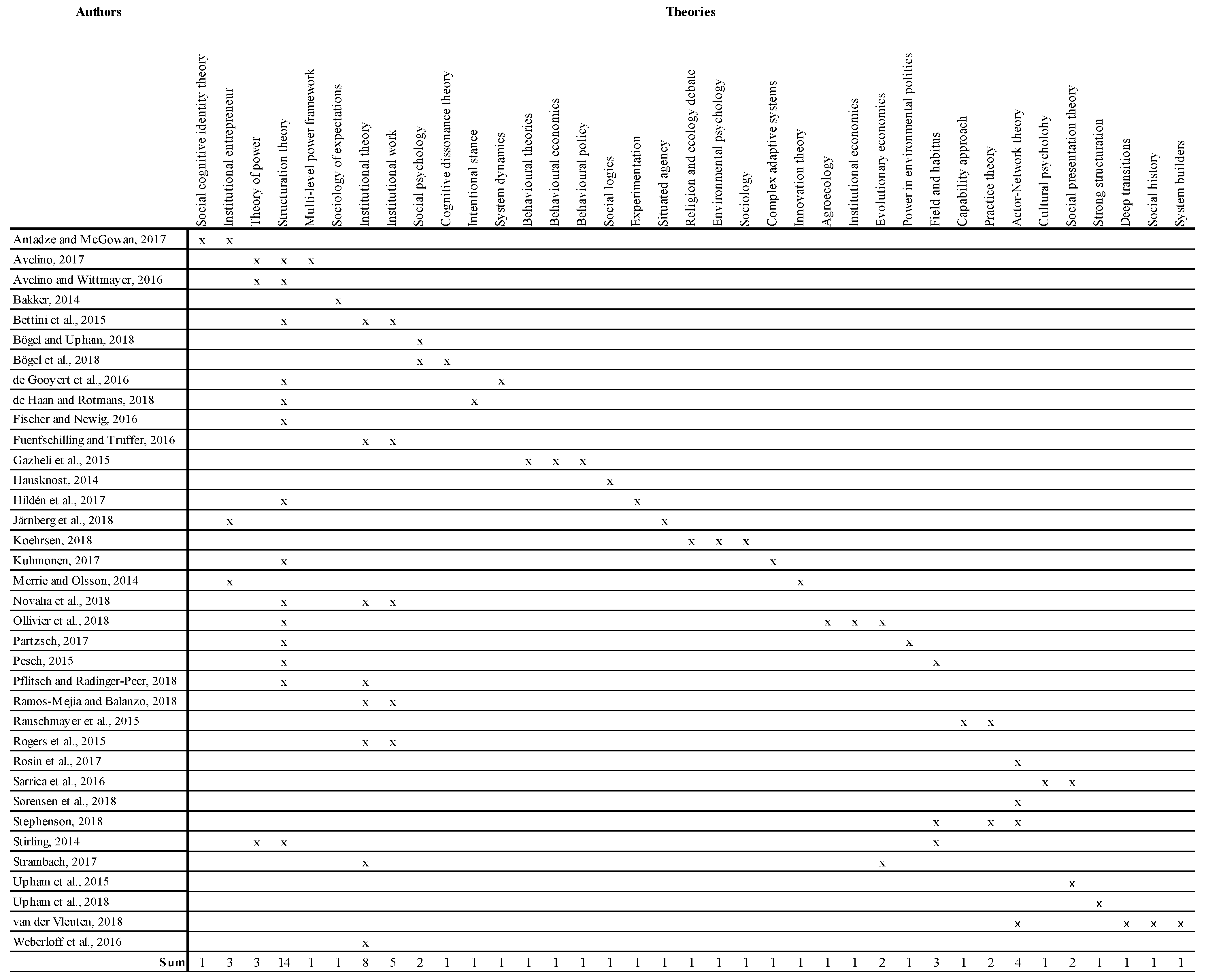
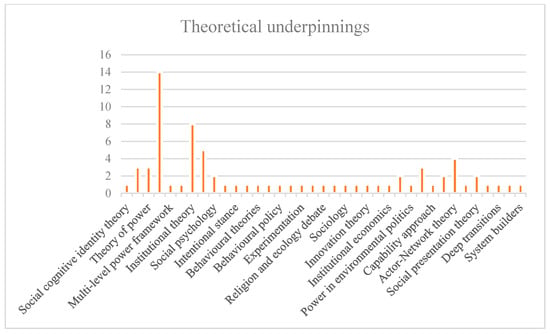
Figure A2.
Theoretical underpinnings illustrated.
Figure A2.
Theoretical underpinnings illustrated.
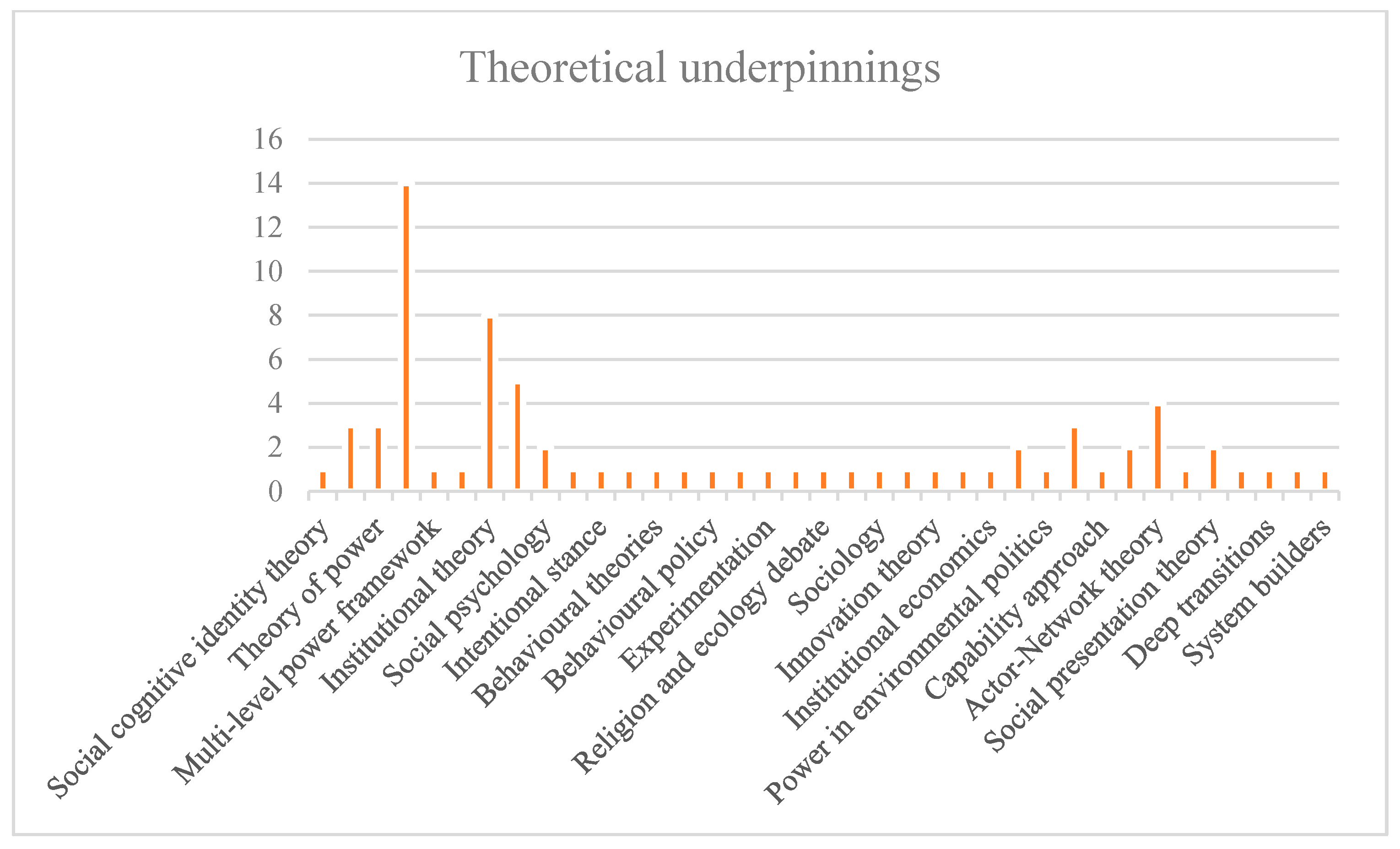
References
- Rockström, J.; Steffen, W.; Noone, K.; Persson, Å.; Chapin, F.S.; Lambin, E.F.; Lenton, T.M.; Scheffer, M.; Folke, C.; Schellnhuber, H.J.; et al. A safe operating space for humanity. Nature 2009, 461, 472–475. [Google Scholar] [CrossRef]
- Fagerberg, J. Mobilizing innovation for sustainability transitions: A comment on transformative innovation policy. Res. Policy 2018, 47, 1568–1576. [Google Scholar] [CrossRef]
- Levänen, J.; Eloneva, S. Fighting sustainability challenges on two fronts: Material efficiency and the emerging carbon capture and storage technologies. Environ. Sci. Policy 2017, 76, 131–193. [Google Scholar] [CrossRef]
- Markard, J.; Raven, R.; Truffer, B. Sustainability transitions: An emerging field of research and its prospects. Res. Policy 2012, 41, 955–967. [Google Scholar] [CrossRef]
- Loorbach, D.; Frantzeskaki, N.; Avelino, F. Sustainability Transit. Research: Transforming Science and Practice for Societal Change. Annu. Rev. Environ. Resour. 2017, 42, 599–626. [Google Scholar] [CrossRef]
- De Haan, F.J.; Rotmans, J. A proposed theoretical framework for actors in transformative change. Technol. Forecast. Soc. Chang. 2018, 128, 275–286. [Google Scholar] [CrossRef]
- Antadze, N.; McGowan, K.A. Moral entrepreneurship: Thinking and acting at the landscape level to foster sustainability transitions. Environ. Innov. Soc. Transit. 2017, 25, 1–13. [Google Scholar] [CrossRef]
- Kivimaa, P.; Boon, W.; Hyysalo, S.; Klerkx, L. Towards a typology of intermediaries in sustainability transitions: A systematic review and a research agenda. Res. Policy 2018, 48, 1062–1075. [Google Scholar] [CrossRef]
- Avelino, F.; Wittmayer, J.M. Shifting power relations in sustainability transitions: A multi-actor perspective. J. Environ. Policy Plan. 2016, 18, 628–649. [Google Scholar] [CrossRef]
- Fischer, L.-B.; Newig, J. Importance of actors and agency in sustainability transitions: A systematic exploration of the literature. Sustainability 2016, 8, 476. [Google Scholar] [CrossRef]
- Van der Vleuten, E. Radical change and deep transitions: Lessons from Europe’s infrastructure transition 1815-2015. Environ. Innov. Soc. Transit. 2018, 32, 22–32. [Google Scholar] [CrossRef]
- Pesch, U. Tracing discursive space: Agency and change in sustainability transitions. Technol. Forecast. Soc. Chang. 2015, 90, 379–388. [Google Scholar] [CrossRef]
- Giddens, A. The Constitution of Society; University of California Press: Berkeley, CA, USA, 1984. [Google Scholar]
- Archer, M. Realist Social Theory: The Morphogenetic Approach; Cambridge University Press: Cambridge, UK, 1995. [Google Scholar]
- Glaser, B.; Strauss, A. The Discovery of Grounded Theory: Strategies for Qualitative Research; Aldine: Chicago, IL, USA, 1967. [Google Scholar]
- Koistinen, K. Actors in Sustainability Transitions; Acta Universitatis Lappeenrantaensis: Lappeenranta, Finland, 2019. [Google Scholar]
- Matschoss, K.; Heiskanen, E. Innovation intermediary challenging the energy incumbent: Enactment of local socio-technical transition pathways by destabilisation of regime rules. Technol. Anal. Strateg. Manag. 2018, 30, 1455–1469. [Google Scholar] [CrossRef]
- Järnberg, L.; Enfors Kautsky, E.; Dagerskog, L.; Olsson, P. Green niche actors navigating an opaque opportunity context: Prospects for a sustainable transformation of Ethiopian agriculture. Land Use Policy 2018, 71, 409–421. [Google Scholar] [CrossRef]
- Goyal, N.; Howlett, M. Technology and instrument constituencies as agents of innovation: Sustainability transitions and the governance of urban transport. Energies 2018, 11, 1198. [Google Scholar] [CrossRef]
- Mercure, J.F. An age structured demographic theory of technological change. J. Evol. Econ. 2015, 25, 787–820. [Google Scholar] [CrossRef]
- Stahlbrand, L. The Food For Life Catering Mark: Implementing the Sustainability Transition in University Food Procurement. Agriculture 2016, 6, 46. [Google Scholar] [CrossRef]
- Affolderbach, J.; Rob Krueger, R. “Just” ecopreneurs: Reconceptualising green transitions and entrepreneurship. Loc. Environ. 2017, 22, 410–423. [Google Scholar] [CrossRef]
- Barnes, J.; Durrant, R.; Kern, F.; MacKerron, G. The institutionalisation of sustainable practices in cities: How initiatives shape local selection environments. Environ. Innov. Soc. Transit. 2018, 29, 68–80. [Google Scholar] [CrossRef]
- Ferguson, R.S.; Lovell, S.T. Grassroots engagement with transition to sustainability. Ecol. Soc. 2015, 20. [Google Scholar] [CrossRef]
- Mossberg, J.; Söderholm, P.; Hellsmark, H.; Nordqvist, S. Crossing the biorefinery valley of death? Actor roles and networks in overcoming barriers to a sustainability transition. Environ. Innov. Soc. Transit. 2018, 27, 83–101. [Google Scholar] [CrossRef]
- Ollivier, G.; Magda, D.; Mazé, A.; Plumecocq, G.; Lamine, C. Agroecological transitions: What can sustainability transition frameworks teach us? An ontological and empirical analysis. Ecol. Soc. 2018, 23. [Google Scholar] [CrossRef]
- Rauschmayer, F.; Bauler, T.; Schäpke, N. Towards a thick understanding of sustainability transitions-Linking transition management, capabilities and social practices. Ecol. Econ. 2015, 109, 211–221. [Google Scholar] [CrossRef]
- Wolfram, M.; Frantzeskaki, N. Cities and systemic change for sustainability: Prevailing epistemologies and an emerging research agenda. Sustainability 2016, 8, 144. [Google Scholar] [CrossRef]
- Pitt, H.; Jones, M. Scaling up and out as a pathway for food system transitions. Sustainability 2016, 8, 1025. [Google Scholar] [CrossRef]
- De Gooyert, V.; Rouwette, E.; van Kranenburg, H.; Freeman, E.; van Breen, H. Sustainability transition dynamics: Towards overcoming policy resistance. Technol. Forecast. Soc. Chang. 2016, 111, 135–145. [Google Scholar] [CrossRef]
- Wanner, M.; Hilger, A.; Westerkowski, J.; Rose, M.; Stelzer, F.; Schäpke, N. Towards a Cyclical Concept of Real-World Laboratories: A Transdisciplinary Research Practice for Sustainability Transitions. Disp 2018, 54, 94–114. [Google Scholar] [CrossRef]
- Brundiers, K.; Eakin, H.C. Leveraging post-disasterwindows of opportunities for change towards sustainability: A framework. Sustainability 2018, 10, 1390. [Google Scholar] [CrossRef]
- Haley, B. Designing the public sector to promote sustainability transitions: Institutional principles and a case study of ARPA-E. Environ. Innov. Soc. Transit. 2017, 25, 107–121. [Google Scholar] [CrossRef]
- Gazheli, A.; Antal, M.; van den Bergh, J. The behavioral basis of policies fostering long-run transitions: Stakeholders, limited rationality and social context. Futures 2015, 69, 14–30. [Google Scholar] [CrossRef]
- Fuenfschilling, L.; Truffer, B. The interplay of institutions, actors and technologies in socio-technical systems-An analysis of transformations in the Australian urban water sector. Technol. Forecast. Soc. Chang. 2016, 103, 298–312. [Google Scholar] [CrossRef]
- Durrant, R.; Barnes, J.; Kern, F.; Mackerron, G. The acceleration of transitions to urban sustainability: A case study of Brighton and Hove. Eur. Plan. Stud. 2018, 26, 1537–1558. [Google Scholar] [CrossRef]
- Kern, F. Engaging with the politics, agency and structures in the technological innovation systems approach. Environ. Innov. Soc. Transit. 2015, 16, 67–69. [Google Scholar] [CrossRef]
- Chelleri, L.; Kua, H.W.; Sánchez, J.P.R.; Md Nahiduzzaman, K.; Thondhlana, G. Are people responsive to a more sustainable, decentralized, and user-driven management of urban metabolism? Sustainability 2016, 8, 275. [Google Scholar] [CrossRef]
- Udovyk, O. “I cannot be passive as I was before”: Learning from grassroots innovations in Ukraine. Eur. J. Res. Educ. Learn. Adults 2017, 8, 1–19. [Google Scholar] [CrossRef][Green Version]
- Pigford, A.A.E.; Hickey, G.M.; Klerkx, L. Beyond agricultural innovation systems? Exploring an agricultural innovation ecosystems approach for niche design and development in sustainability transitions. Agric. Syst. 2018, 164, 116–121. [Google Scholar] [CrossRef]
- Randelli, F.; Rocchi, B. Analysing the role of consumers within technological innovation systems: The case of alternative food networks. Environ. Innov. Soc. Transit. 2017, 25, 94–106. [Google Scholar] [CrossRef]
- Bögel, P.; Oltra, C.; Sala, R.; Lores, M.; Upham, P.; Dütschke, E.; Schneider, U.; Wiemann, P. The role of attitudes in technology acceptance management: Reflections on the case of hydrogen fuel cells in Europe. J. Clean. Prod. 2018, 188, 125–135. [Google Scholar] [CrossRef]
- Condorelli, R. Complex Systems Theory: Some Considerations for Sociology. Open J. App. Sci. 2016, 6, 422–448. [Google Scholar] [CrossRef]
- DiMaggio, P.J.; Powell, W.W. The Iron Cage Revisited: Institutional Isomorphism and Collective Rationality in Organizational Fields. Amer. Sociol. Rev. 1983, 48, 147–160. [Google Scholar] [CrossRef]
- Bettini, Y.; Brown, R.R.; de Haan, F.J.; Farrelly, M. Understanding institutional capacity for urban water transitions. Technol. Forecast. Soc. Chang. 2015, 94, 65–79. [Google Scholar] [CrossRef]
- Novalia, W.; Brown, R.R.; Rogers, B.C.; Bos, J.J. A diagnostic framework of strategic agency: Operationalising complex interrelationships of agency and institutions in the urban infrastructure sector. Environ. Sci. Policy 2018, 83, 11–21. [Google Scholar] [CrossRef]
- Werbeloff, L.; Brown, R.R.; Loorbach, D. Pathways of system transformation: Strategic agency to support regime change. Environ. Sci. Policy 2016, 66, 119–128. [Google Scholar] [CrossRef]
- Rogers, B.C.; Brown, R.R.; De Haan, F.J.; Deletic, A. Analysis of institutional work on innovation trajectories in water infrastructure systems of Melbourne, Australia. Environ. Innov. Soc. Transit. 2015, 15, 42–64. [Google Scholar] [CrossRef]
- Merrie, A.; Olsson, P. An innovation and agency perspective on the emergence and spread of Marine Spatial Planning. Mar. Policy 2014, 44, 366–374. [Google Scholar] [CrossRef]
- Ramos-Mejía, M.; Balanzo, A. What it takes to lead sustainability transitions from the bottom-up: Strategic interactions of grassroots ecopreneurs. Sustainability 2018, 10, 2294. [Google Scholar] [CrossRef]
- Avelino, F. Power in Sustainability Transitions: Analysing power and (dis)empowerment in transformative change towards sustainability. Environ. Policy Gov. 2017, 27, 505–520. [Google Scholar] [CrossRef]
- Hildén, M.; Jordan, A.; Huitema, D. Special issue on experimentation for climate change solutions editorial: The search for climate change and sustainability solutions-The promise and the pitfalls of experimentation. J. Clean. Prod. 2017, 169, 1–7. [Google Scholar] [CrossRef]
- Stephenson, J. Sustainability cultures and energy research: An actor-centred interpretation of cultural theory. Energy Res. Soc. Sci. 2018, 44, 242–249. [Google Scholar] [CrossRef]
- Stones, R. Structuration Theory; Palgrave Macmillan: Basingstoke, NY, USA, 2005. [Google Scholar]
- Kuhmonen, T. Exposing the attractors of evolving complex adaptive systems by utilising futures images: Milestones of the food sustainability journey. Technol. Forecast. Soc. Chang. 2017, 114, 214–225. [Google Scholar] [CrossRef]
- Pflitsch, G.; Radinger-Peer, V. Developing boundary-spanning capacity for regional sustainability transitions-A comparative case study of the universities of Augsburg (Germany) and Linz (Austria). Sustainability 2018, 10, 918. [Google Scholar] [CrossRef]
- Partzsch, L. “Power with” and “power to” in environmental politics and the transition to sustainability. Environ. Polit. 2017, 26, 193–211. [Google Scholar] [CrossRef]
- Stirling, A. Transforming power: Social science and the politics of energy choices. Energy Res. Soc. Sci. 2014, 1, 83–95. [Google Scholar] [CrossRef]
- King, A. The odd couple: Margaret Archer, Anthony Giddens and British social theory. British Soc. J. 2010, 61, 253–260. [Google Scholar] [CrossRef] [PubMed]
- Bakker, S. Actor rationales in sustainability transitions-Interests and expectations regarding electric vehicle recharging. Environ. Innov. Soc. Transit. 2014, 13, 60–74. [Google Scholar] [CrossRef]
- Hausknost, D. Decision, choice, solution: “agentic deadlock” in environmental politics. Environ. Polit. 2014, 23, 357–375. [Google Scholar] [CrossRef]
- Upham, P.; Dütschke, E.; Schneider, U.; Oltra, C.; Sala, R.; Lores, M.; Klapper, R.; Bögel, P. Agency and structure in a sociotechnical transition: Hydrogen fuel cells, conjunctural knowledge and structuration in Europe. Energy Res. Soc. Sci. 2018, 37, 163–174. [Google Scholar] [CrossRef]
- Koehrsen, J. Religious agency in sustainability transitions: Between experimentation, upscaling, and regime support. Environ. Innov. Soc. Transit. 2018, 27, 4–15. [Google Scholar] [CrossRef]
- Bögel, P.; Upham, P. The role of psychology in sociotechnical transitions literature: A review and discussion in relation to consumption and technology acceptance. Environ. Innov. Soc. Transit. 2018, 28, 122–136. [Google Scholar] [CrossRef]
- Geels, F. Ontologies, socio-technical transitions (to sustainability), and the multi-level perspective. Res. Policy 2010, 39, 495–510. [Google Scholar] [CrossRef]
- Young, O.R. A survey of general systems theory. Gen. Syst. 1964, 9, 61–80. [Google Scholar]
- Nelson, R.R.; Winter, S. An Evolutionary Theory of Economic Change; Harvard University Press: Cambridge, MA, USA, 1982. [Google Scholar]
- Dosi, G. Technological paradigms and technological trajectories: A suggested interpretation of the determinants and directions of technical change. Res. Policy 1982, 6, 147–162. [Google Scholar] [CrossRef]
- Meyer, J.W.; Rowan, B. Institutionalized organizations: Formal structure as myth and ceremony. Amer. J. Soc. 1977, 83, 340–363. [Google Scholar] [CrossRef]
- DiMaggio, P.J. Interest and Agency in Institutional Theory. In Institutional Patterns in Organizations: Culture and Environments; Zucker, L.G., Ed.; Ballinger Publishing: Cambridge, MA, USA, 1988. [Google Scholar]
- Garud, R.; Jain, S.; Kumaraswamy, A. Institutional entrepreneurship in the sponsorship of common technological standards: The case of Sun Microsystems and Java. Acad. Manag. J. Manag. J. 2002, 45, 196–214. [Google Scholar]
- King, A. Against structure: A critique of morphogenetic social theory. Soc. Rev. 1999, 47, 199–227. [Google Scholar] [CrossRef]
- Ritzer, G.; Stepnisky, J. Sociological Theory; McGraw-Hill Education: New York, NY, USA, 2014. [Google Scholar]
- Bandura, A. Social cognitive theory: An agentic perspective. Ann. Rev. Psych. 2001, 52, 1–26. [Google Scholar] [CrossRef]
- Gaede, J.; Meadowcroft, J. A question of authenticity: Status quo bias and the international energy agency’s world energy outlook. J. Environ. Policy Plan. 2016, 18, 608–627. [Google Scholar] [CrossRef]
- Arapostathis, S.; Pearson, P.J.G.; Foxon, T.J. UK natural gas system integration in the making, 1960-2010: Complexity, transitional uncertainties and uncertain transitions. Environ. Innov. Soc. Trans. 2014, 11, 87–102. [Google Scholar] [CrossRef]
- Lockwood, M.; Kuzemko, C.; Mitchell, C.; Hoggett, R. Historical institutionalism and the politics of sustainable energy transitions: A research agenda. Environ. Plan. C Gov. Policy 2017, 35, 312–333. [Google Scholar] [CrossRef]
- Mercure, J.F.; Pollitt, H.; Bassi, A.M.; Viñuales, J.E.; Edwards, N.R. Modelling complex systems of heterogeneous agents to better design sustainability transitions policy. Glob. Environ. Chang. 2016, 37, 102–115. [Google Scholar] [CrossRef]
- Boodoo, Z.; Mersmann, F.; Olsen, K.H. The implications of how climate funds conceptualize transformational change in developing countries. Clim. Dev. 2018, 10, 673–686. [Google Scholar] [CrossRef]
- Klinke, A. Dynamic multilevel governance for sustainable transformation as postnational configuration. Innovation 2017, 30, 323–349. [Google Scholar] [CrossRef]
- Gorissen, L.; Vrancken, K.; Manshoven, S. Transition thinking and business model innovation-towards a transformative business model and new role for the reuse centers of Limburg, Belgium. Sustainability 2016, 8, 112. [Google Scholar] [CrossRef]
- Pesch, U.; Vernay, A.L.; van Bueren, E.; Pandis Iverot, S. Niche entrepreneurs in urban systems integration: On the role of individuals in niche formation. Environ. Plan. A 2017, 49, 1922–1942. [Google Scholar] [CrossRef]
- Van Poeck, K.; Læssøe, J.; Block, T. An exploration of sustainability change agents as facilitators of nonformal learning: Mapping a moving and intertwined landscape. Ecol. Soc. 2017, 22. [Google Scholar] [CrossRef]
- Wittmayer, J.M.; Schäpke, N. Action, research and participation: Roles of researchers in sustainability transitions. Sustain. Sci. 2014, 9, 483–496. [Google Scholar] [CrossRef]
- Hermans, F.; Roep, D.; Klerkx, L. Scale dynamics of grassroots innovations through parallel pathways of transformative change. Ecol. Econ. 2016, 130, 285–295. [Google Scholar] [CrossRef]
- Bergek, A.; Hekkert, M.; Jacobsson, S.; Markard, J.; Sandén, B.; Truffer, B. Technological innovation systems in contexts: Conceptualizing contextual structures and interaction dynamics. Environ. Innov. Soc. Transit. 2015, 16, 51–64. [Google Scholar] [CrossRef]
- Bolton, R.; Foxon, T.J.; Hall, S. Energy transitions and uncertainty: Creating low carbon investment opportunities in the UK electricity sector. Environ. Plan. C Gov. Policy 2015, 34, 1387–1403. [Google Scholar] [CrossRef]
- De Haan, F.J.; Rogers, B.C.; Brown, R.R.; Deletic, A. Many roads to Rome: The emergence of pathways from patterns of change through exploratory modelling of sustainability transitions. Environ. Model. Softw. 2016, 85, 279–292. [Google Scholar] [CrossRef]
- Sørensen, K.H.; Lagesen, V.A.; Hojem, T.S.M. Articulations of sustainability transition agency. Mundane transition work among consulting engineers. Environ. Innov. Soc. Trans. 2018, 28, 70–78. [Google Scholar] [CrossRef]
- Kuokkanen, A.; Nurmi, A.; Mikkilä, M.; Kuisma, M.; Kahiluoto, H.; Linnanen, L. Agency in regime destabilization through the selection environment: The Finnish food system’s sustainability transition. Res. Policy 2018, 47, 1513–1522. [Google Scholar] [CrossRef]
- Frantzeskaki, N.; Wittmayer, J.; Loorbach, D. The role of partnerships in “realising” urban sustainability in Rotterdam’s City Ports Area, the Netherlands. J. Clean. Prod. 2014, 65, 406–417. [Google Scholar] [CrossRef]
- Kivimaa, P.; Martiskainen, M. Dynamics of policy change and intermediation: The arduous transition towards low-energy homes in the United Kingdom. Energy Res. Soc. Sci. 2018, 44, 83–99. [Google Scholar] [CrossRef]
- Upham, P.; Lis, A.; Riesch, H.; Stankiewicz, P. Addressing social representations in socio-technical transitions with the case of shale gas. Environ. Innov. Soc. Trans. 2015, 16, 120–141. [Google Scholar] [CrossRef]
- Sarrica, M.; Brondi, S.; Cottone, P.; Mazzara, B.M. One, no one, one hundred thousand energy transitions in Europe: The quest for a cultural approach. Energy Res. Soc. Sci. 2016, 13, 1–14. [Google Scholar] [CrossRef]
- Davidson, D.J.; Jones, K.E.; Parkins, J.R. Food safety risks, disruptive events and alternative beef production: A case study of agricultural transition in Alberta. Agric. Hum. Values 2016, 33, 359–371. [Google Scholar] [CrossRef]
- Johannessen, Å.; Wamsler, C. What does resilience mean for urban water services? Ecol. Soc. 2017, 22, 1. [Google Scholar] [CrossRef]
- Sorrell, S. Reducing energy demand: A review of issues, challenges and approaches. Renew. Sustain. Energy Rev. 2015, 47, 74–82. [Google Scholar] [CrossRef]
- Hölscher, K.; Wittmayer, J.; Loorbach, D. Transition versus transformation: What’s the difference? Environ. Innov. Soc. Trans. 2018, 27, 1–3. [Google Scholar] [CrossRef]
- Temper, L.; Walter, M.; Rodriguez, I.; Kothari, A.; Turhan, E. A perspective on radical transformations to sustainability: Resistances, movements and alternatives. Sustain. Sci. 2018, 13, 747–764. [Google Scholar] [CrossRef]
- Burrell, G.; Morgan, G. Sociological Paradigms and Organisational Analysis; Heinemann: Burlington, VT, USA, 1979. [Google Scholar]
Publisher’s Note: MDPI stays neutral with regard to jurisdictional claims in published maps and institutional affiliations. |
© 2021 by the authors. Licensee MDPI, Basel, Switzerland. This article is an open access article distributed under the terms and conditions of the Creative Commons Attribution (CC BY) license (http://creativecommons.org/licenses/by/4.0/).

